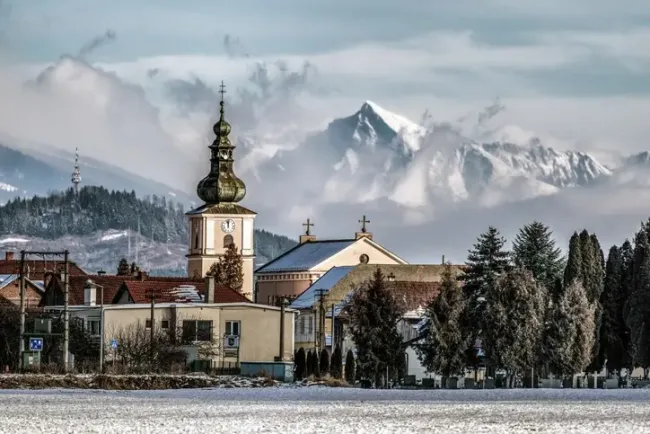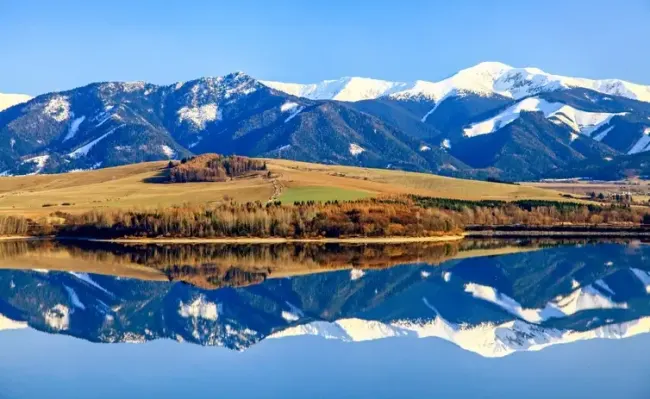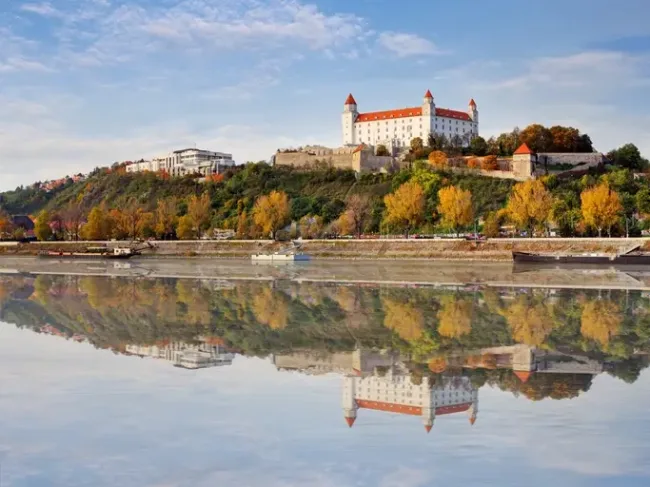
Welcome to Slovakia
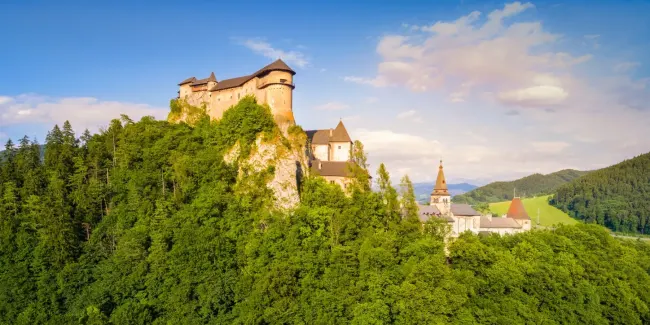
Whether you love adventure, historical monuments, or peaceful landscapes, Slovakia is a perfect destination. Surrounded by Austria, Czech Republic, Poland, Ukraine, Romania, and Hungary, this country is a hidden gem in Europe, offering a lot of worth-visiting attractions and affordable prices.
This ultimate Slovakia travel guide will help you make the most of your trip in this Central European country with helpful tips and valuable travel advice.
Document checklist for Slovakia
-
Valid passport (must be valid for at least six months from the date of entry and have two blank pages)
-
Sufficient funds to cover your trip
-
Return or onward ticket
Essential Slovakia travel information
-
Currency - Euro (€). $1 is equivalent to approx. €0.94.
-
Daily budget for 1 person - Allow a daily budget of €101 ($83).
-
Languages - Slovak is the official language of the Slovak Republic. English is widely spoken in major cities, mainly by younger people.
-
Number of travelers per year - In 2018, 15,299,000 travelers visited Slovakia, according to the World Bank.
-
Socket type - Types C and E, 230V supply voltage and 50Hz.
-
Time zone - Central European Standard Time (GMT+1).
-
Top 3 cities to visit - Bratislava, Banská Štiavnica, and Kosice.
-
Top 3 landmarks/monuments -The Blue Church, High Tatras, and Spiš Castle.
Visa information for Slovakia
The Slovakia Republic is a Schengen member, so the country applies the Schengen Zone entry restrictions. This means that tourists have to apply for a Schengen Visa or ETIAS to enter the territory.
Schengen Area: The Slovakia Schengen Visa explained
Most travelers from a non-EU country need a Schengen Visa for their Slovakia travel. The Schengen Area englobes many popular European destinations, and once you have the visa, you can travel freely among them.
The document is valid for a minimum of 180 days and a maximum of 5 years. The local authorities decide on the validity granted to the traveler and also if the visa will allow multiple, double, or single entries.
Slovakia ETIAS explained
The ETIAS is the Slovakia travel document for visa-exempt countries. Similar to the Schengen Visa, with an ETIAS, you can travel around the Schengen Area without needing a singular document for each country you visit. Unlike a visa, you can do the entire application process online. The document allows you to stay up to 90 days in the Schengen Zone for visiting or business purposes.
You can use the Visa Checker Tool to be sure which document you need for this trip.
Visa difficulty index for Slovakia
Accessibility: 3/5
The Schengen Visa is a paper visa, so the process involves gathering documents, filling out a form, and an interview. Luckily, you can count on iVisa Guidance services to make the application smoother and have all the help you need to get this Slovakia travel document.
Time to get your visa: 1/5
The processing time takes around 30 days. We advise applying a couple of months before the trip.
Costs: 3/5
The government standard Schengen visa fee is €80 (US$84). Children have a reduced fee: €40 for those between the ages of six and twelve, and those under six are entirely exempt from payment.
Typical costs and budget for Slovakia
Here is a guide to what you'll spend on a daily basis traveling through Slovakia on a mid-range budget.
-
Daily spending - Around €101 ($108) per person, per day. This includes:
-
Meals - Expect to spend about €30 ($32) in total for three meals per day.
-
Transport - Depending on your travel plans and standard of travel, local transportation may cost up to €5,81 ($6,20) per day.
-
Hotel - The average hotel price in Slovakia for a couple is €93 ($100). On average, a trip to Slovakia for two people for one week will cost €1,408 ($1,509).
Travel advice: Transport and best ways to travel around Slovakia
There are many ways to get to and around Slovakia, whether flying, by train, or by road. Here are some tips for navigating the country safely.
Flying to Slovakia
Traveling to Slovakia, you probably will fly to the capital, which has the biggest international airport in the country. Several major airlines offer flights to Bratislava airport (BTS):
-
Ryanair, with direct flights from London.
-
Norse Atlantic Airways, with direct flights from Paris.
-
Regiojet, with direct flights from Prague.
-
Austrian Airlines
-
Eurowings
-
Flydubai
-
Wizz Air
Arrival and immigration tips for Slovakia
Arriving in a new country is always a bit stressful. You are tired, have to find your baggage, find the exit, and figure out how to go to the hotel. So here are a few tips to make your arrival smoother:
-
Have your passport and Slovakia Schengen Visa or ETIAS in your hands. You must present the entry document to local authorities.
-
Be aware that customs officials may ask for specific certificates if you travel with pets or medicine, for example. Click here for more details about Slovakia's import and export regulations.
-
Leave food in your hand luggage. Sometimes, you don’t have enough time to eat during the stopover. It’s always a good idea to have an easy-access snack.
-
When departing, arrive at least 4 hours before boarding at the airport. This is time enough to avoid missing your flight due to traffic jams or airport lines.
Train travel in Slovakia
The train is a comfortable and affordable option to explore Slovakia. Main cities have railway stations with daily connections, being easy to cross the country by train. You can check the ticket prices on the Slovak Railway website.
Buses in Slovakia
The bus is a public transportation option widely available throughout Slovakia. While cheaper than trains, buses may take longer to reach their destinations. Nonetheless, opting for a bus ride can be more advantageous in cases where the schedules and routes do not intersect with those of the trains. Additionally, when traveling from one town to another via bus, passengers can purchase tickets directly from the driver upon boarding by indicating their destination.
Road trip in Slovakia
A rental car can be an option to explore Slovakia at your own pace if you have an international driving permit. It’s a small country, so you can cover the biggest cities in a few hours on the road. For example, a journey from Bratislava to Košice takes about 5 hours (400 – 450 km), while traveling to Banská Bystrica (210 km) or Žilina (200 km) takes just 2 hours.
Roads are in good condition, and local laws and signs comply with European standards.
Traveling by bike in Slovakia
The bike is not ideal for traveling around Slovakia due to the local landscape. However, while many areas have a mountainous terrain, the environment surrounding Bratislava boasts well-preserved bike paths that extend into Austria and Hungary. Otherwise, you can venture into the Little Carpathians if you want a more challenging cycling experience.
Safety in Slovakia
This central European country is quite safe for travelers. However, we should always take some precautions when visiting a new country abroad. Here are our recommendations:
-
Petty crime may happen in any tourist area of the world. So keep personal belongings close, particularly on public transport. If something happens, look for orientation at the nearest police station.
-
Drink-spiking may occur in bars or nightclubs. Do not leave drinks unattended.
-
Large gatherings can turn violent. Avoid manifestations and protests.
-
Weather in mountain regions can change quickly. It’s not recommended to ski outside the prepared ski areas.
-
To avoid scams, check your change twice, negotiate prices beforehand, and never give your money before you receive the service you're paying for.
Another important tip is to purchase travel insurance in advance. Emergency situations are not predictable, so it’s better to have support for medical evacuation, just in case.
Weather in Slovakia
Slovakia has a continental climate featuring slightly hot summers and cold winters. July and August are the warmest months, followed by June. Springtime, particularly the majority of May, is the best time to visit Slovakia, with warm days and consistently pleasant, mild temperatures. This season also marks the blossoming of fruit trees, presenting stunning displays of blooms.
The autumn months (September and October) are an excellent time to witness the colorful foliage of the country's heavily forested areas. Winter has its appeal too, as Bratislava becomes a picturesque sight when blanketed in snow.
The average temperatures in Bratislava vary from 2°C (36°F) in the winter and 26°C (79°F) during the summer.
Tourist attractions: Must do and see in Slovakia
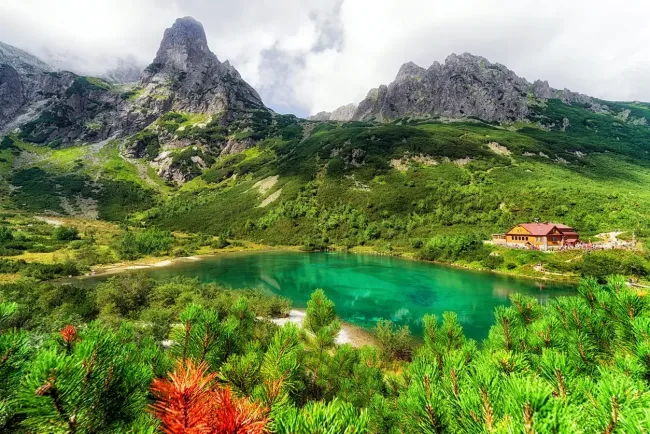
Slovakia has attractions for all tourist types. You can hike in the parks or enjoy charming historical European cities. Make sure you don’t miss these remarkable sights on your Slovakia trip:
-
Visit the Blue Church in Bratislava. The beautiful church, built at the beginning of the 20th century, is an art nouveau architecture symbol in the country.
-
Hike to the Zelene Pleso Lake in Slovakia’s High Tatras. Also known as Green Lake, it is a beautiful spot in the Tatra National Park.
-
Explore the Slovak Paradise National Park. It’s a perfect destination for outdoor enthusiasts, with forests, meadows, plateaus, canyons, and caves.
-
Learn about local history in the Open Air Mining Museum in Banska Stiavnica. The museum tells the history of mining in the area and Slovakia in general.
-
Visit the Ochtinska Aragonit Cave, a UNESCO Natural World Heritage. The rare cave is a unique natural phenomenon due to the richness and variety of aragonite fill.
Typical Slovak food to try
-
Bryndzové Halušky - The national recipe of Slovakia. It combines potato dumplings with roasted bacon and sheep’s cheese. Once the dumplings are filled with cheese, the dish is topped with sour cream, fried onion, spring onion, and crispy bacon pieces.
-
Kapustnica - This warming soup mixes sauerkraut, dried mushrooms, sliced sausage, and onions. It is served with sour cream.
-
Segedin Goulash - Slovakia has its own version of the Hungarian goulash. It consists of pork shoulder chunks stewed with sauerkraut and thickened with heavy cream.
-
Mäsové Guľky - This delicious entrée dish consists of meatballs and potatoes. The meat is rolled in a dough of potatoes, served over steamed cabbage, and topped with spring and roasted onion.
Vaccine information for Slovakia
Are you up-to-date with your routine vaccines? Before traveling, it’s important to know the recommended vaccines and COVID-19 measures to enter Slovakia. You can check the CDC website for more details about vaccine requirements and any medical advice to visit the country.
Castles in Slovakia
Visiting its castles is one of the best ways to experience Slovakia's history and charm. With over 180 castles and chateaus scattered throughout the country, visitors are spoilt for choice. To help you to plan the itinerary, we highlighted the must-see castles in Slovakia:
-
Bratislava Castle: The castle dates back to the 9th century and has undergone numerous renovations and expansions over the centuries. Visitors can explore the museum, which features exhibitions on the history of Slovakia and the castle itself. The castle's courtyard and gardens also offer stunning views of the city below.
-
Spiš Castle: It is one of the largest castle complexes in Central Europe. The castle's origins date back to the 12th century, and it has been designated a UNESCO World Heritage Site. The ruins include a military fortress during the Middle Ages; it’s like traveling through time.
-
Orava Castle: Perched on a rocky cliff overlooking the Orava River, this is one of the most picturesque castles in Slovakia. It was built in the 13th century and has been used as a location for several films, including the iconic horror movie Nosferatu.
-
Bojnice Castle: This is one of the most romantic castles in Europe. Its architecture blends Gothic and Renaissance styles and its interiors are decorated with ornate stucco work and frescoes.
As you can see, Slovakia has a lot to offer! Get the travel documents you need and be ready to explore this fantastic destination.
- iVisa is NOT affiliated with any government agency. This site does not provide legal advice and we are not a law firm. None of our customer service representatives are lawyers and they also do not provide legal advice. We are a private, internet-based travel and immigration consultancy provider dedicated to helping individuals travel around the world. You may apply by yourself directly on the various government websites. The source of information: https://www.mic.iom.sk/en/

 India Visa
India Visa
 Turkey Visa
Turkey Visa
 United States Visa
United States Visa
 Australia Visa
Australia Visa
 Colombia Visa
Colombia Visa
 New Zealand Visa
New Zealand Visa
 China Visa
China Visa
 Egypt Visa
Egypt Visa
 Vietnam Visa
Vietnam Visa
 Indonesia Visa
Indonesia Visa
 UK Passport Renewal
UK Passport Renewal
 CA Passport Renewal
CA Passport Renewal
 IE Passport Renewal
IE Passport Renewal
